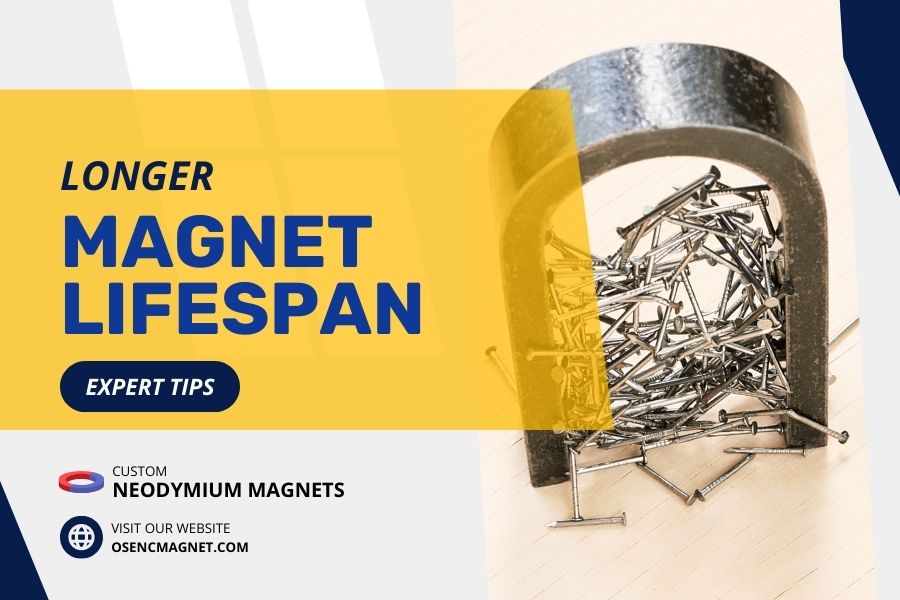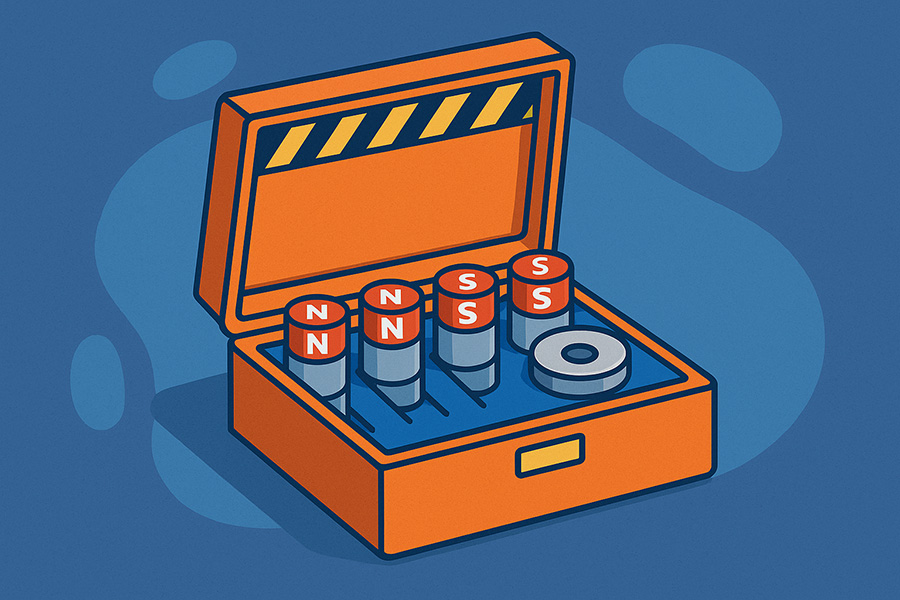- Last updated: June 29, 2024
Magnets play a vital role in various industries, from electronics to healthcare. As a result, it’s essential to ensure their longevity to avoid frequent replacements, which can be costly and time-consuming.
Whether you’re a magnet user for industrial applications or a hobbyist, it’s essential to know how to maintain your magnets properly. In this article, we’ll provide you with some practical tips to help you extend the lifespan of your magnets.
The concept of magnet lifespan
In simple terms, the lifespan of a magnet refers to the duration for which it retains its magnetic properties. Neodymium magnets, for instance, are known to have a long lifespan of up to 20 years, but this can be shortened significantly if they are not stored or handled correctly. The magnet lifespan is affected by various factors such as exposure to high temperatures, moisture, mechanical stress, and demagnetizing fields. Therefore, it’s essential to take proper care of magnets to ensure they last for their intended lifespan. In this post, we will share some tips on how to extend the lifespan of magnets, which will not only save you money in the long run but also help you get the most out of your magnets.
Tips for extending magnet lifespan
Magnets are widely used in many industries due to their unique properties, such as the ability to attract and repel other magnets, making them a valuable component in many devices.
However, over time, magnets can lose their strength, which can affect their performance and lifespan. To help ensure your magnets last as long as possible, we’ve compiled a list of tips to extend their lifespan. In this section, we will explore these tips in detail.
1). Choosing the right magnet for the application
Choosing the right magnet for a specific application is crucial for extending its lifespan. Different applications require magnets with different properties such as strength, size, shape, and temperature resistance.
For example, if you need a magnet for a high-temperature application, you need to choose a magnet that is capable of withstanding the heat.
Similarly, if you need a magnet for a corrosive environment, you need to choose a magnet that is resistant to corrosion. By choosing the right magnet for the application, you can ensure that the magnet performs optimally and has a longer lifespan.
2). Proper handling and installation
Proper handling and installation of magnets are crucial to their lifespan. When handling magnets, it is important to avoid dropping or hitting them as they can easily crack or chip, causing a decrease in their magnetic strength. When installing magnets, it is important to ensure that the magnet is in the correct position and orientation for the application, as this can affect its performance and longevity.
Another important consideration when handling and installing magnets is to avoid exposure to strong magnetic fields, which can cause demagnetization. For this reason, it is important to keep magnets away from other magnets or magnetic materials when not in use, and to handle them with care when in use.
Additionally, it is important to avoid exposing magnets to excessive heat, as this can also cause demagnetization. Magnets should be kept in a stable and cool environment, away from sources of heat such as direct sunlight or hot machinery.
Proper cleaning and maintenance of magnets can also help extend their lifespan. Magnets should be cleaned regularly to remove any dirt or debris that may accumulate on the surface, as this can affect their performance. However, it is important to use a gentle cleaning method that does not involve harsh chemicals or abrasive materials, which can scratch or damage the magnet.
Overall, proper handling, installation, and maintenance of magnets are essential to their longevity and performance in any application. By following these tips, users can help ensure that their magnets remain strong and effective for years to come.
3). Protecting magnets from external factors
Magnets can be vulnerable to external factors that can impact their performance and lifespan. To ensure that your magnets remain in good condition, it’s essential to protect them from these external factors. Here are some tips on how to protect your magnets from external factors:
Corrosion: Magnets can corrode over time, especially if they are exposed to moisture or chemicals. To protect your magnets from corrosion, consider coating them with a protective layer, such as epoxy or nickel.
Temperature: Extreme temperatures can affect the performance and lifespan of magnets. High temperatures can demagnetize magnets, while low temperatures can make them brittle and prone to cracking. It’s essential to keep magnets at a stable temperature and avoid exposing them to extreme heat or cold.
Radiation: Radiation can also impact the performance of magnets. If your magnets are exposed to radiation, they may lose their magnetic properties. To protect your magnets from radiation, consider using radiation-resistant materials, or shielding them with a protective layer.
Vibration: Vibrations can cause magnets to lose their magnetism over time. To protect your magnets from vibration, consider using a cushioning material, such as rubber, to absorb shock and reduce the impact of vibrations.
By taking the necessary steps to protect your magnets from external factors, you can help extend their lifespan and ensure that they remain in good condition for longer.
3. Common mistakes to avoid
Extending the lifespan of magnets is crucial to ensure their optimal performance and efficiency.
However, many users make some common mistakes that can significantly reduce the lifespan of magnets. In this section, we will discuss some of these mistakes and provide tips on how to avoid them.
By avoiding these mistakes, you can help to ensure that your magnets have a longer lifespan and continue to perform at their best.
1). Overloading or overworking magnets
Overloading or overworking magnets is one of the most common mistakes that people make when it comes to extending magnet lifespan. Magnets are designed to operate within a certain range of magnetic fields and temperatures. When you exceed these limits, you risk damaging the magnet or reducing its lifespan.
To avoid overloading or overworking magnets, it’s important to know the magnetic properties of the magnet and the application requirements. You should ensure that the magnet is not subjected to magnetic fields that are too strong for its design or that the temperature of the magnet is not too high.
Additionally, you should avoid exposing the magnet to vibration or shock, which can lead to physical damage or loss of magnetization. Overworking a magnet can also cause it to lose its magnetic properties over time, which can reduce its overall lifespan. Therefore, it’s important to choose the right magnet for the application and operate it within the manufacturer’s specified limits.
2). Improper cleaning and maintenance
Proper cleaning and maintenance are crucial for extending the lifespan of magnets. One of the most common mistakes people make is using harsh chemicals or solvents for cleaning magnets. Harsh chemicals and solvents can damage the surface of the magnets and reduce their effectiveness. It is important to use mild soap and water to clean magnets. If a magnet is particularly dirty, a soft cloth or sponge can be used to gently scrub the surface.
Another mistake people make is not cleaning magnets regularly. Dirt, dust, and debris can accumulate on the surface of magnets, reducing their magnetic strength over time. Regular cleaning can help prevent this from happening. Additionally, it is important to dry the magnets thoroughly after cleaning to prevent rust and corrosion.
In terms of maintenance, magnets should be regularly inspected for signs of wear or damage. If a magnet is cracked, chipped, or otherwise damaged, it should be replaced immediately. Additionally, magnets should be stored properly when not in use to prevent damage from impacts or exposure to external factors.
3). Extreme temperatures or corrosive environments
Magnets are sensitive to temperature changes and exposure to corrosive environments. High temperatures can cause permanent damage to magnets, such as demagnetization or a reduction in magnetic strength. Conversely, exposure to low temperatures can make magnets brittle and prone to cracking or breaking.
Corrosive environments, such as those with high humidity or chemicals, can also damage magnets over time. The best way to protect magnets from corrosive environments is to use protective coatings or enclosures.
To extend the lifespan of magnets, it’s important to avoid exposing them to extreme temperatures or corrosive environments whenever possible. If exposure to these conditions is unavoidable, it’s important to take extra precautions to protect the magnets, such as using protective coatings or enclosures, and monitoring their performance regularly.
In conclusion, extending the lifespan of magnets can help save time, money, and resources.
Choosing the right magnet for the application, proper handling and installation, and protecting magnets from external factors are some of the best practices for extending the lifespan of magnets.
Additionally, avoiding common mistakes such as overloading or overworking magnets, improper cleaning and maintenance, and exposure to extreme temperatures or corrosive environments is essential.
By following these tips and avoiding common mistakes, you can ensure that your magnets last longer and perform at their best for years to come.



